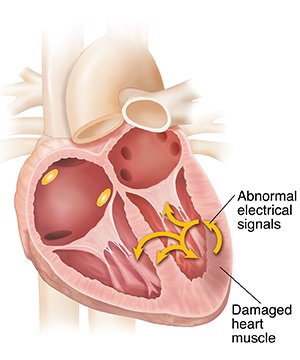Ventricular Tachycardia

Rapid electrical signals from the ventricles can result in a fast heart rhythm called ventricular tachycardia (VT).
With VT, abnormal electrical pathways or circuits form in the ventricles. This can be caused by any disease that damages the heart muscle. Or it can be caused by a problem you have inherited. It’s most commonly seen as a result of a heart attack or coronary artery disease.
Electrical signals enter the abnormal circuit and loop around. With each loop, the signal tells the ventricles to contract. This makes the heart beat very fast. The heart may be beating too fast to pump blood. This can cause you to pass out. It can also cause cardiac arrest, leading to sudden death.
A less serious form of VT happens when overly excited ventricular muscle cells take over the heart rhythm. The heart is otherwise normal.
In some cases, VT develops into ventricular fibrillation. This is the most serious type of arrhythmia. It is fatal if not promptly treated.









